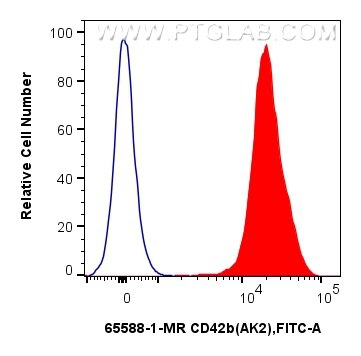Validation Data Gallery
Tested Applications
| Positive FC detected in | human peripheral blood platelets |
Recommended dilution
| Application | Dilution |
|---|---|
| Flow Cytometry (FC) | FC : 0.25 ug per 10^6 cells in 100 μl suspension |
| This reagent has been tested for flow cytometric analysis. It is recommended that this reagent should be titrated in each testing system to obtain optimal results. | |
| Sample-dependent, Check data in validation data gallery. | |
Product Information
65588-1-MR targets CD42b in FC applications and shows reactivity with Human samples.
| Tested Reactivity | Human |
| Host / Isotype | Mouse / IgG2a |
| Class | Recombinant |
| Type | Antibody |
| Immunogen | Human platelets 相同性解析による交差性が予測される生物種 |
| Full Name | glycoprotein Ib (platelet), alpha polypeptide |
| Calculated molecular weight | 626 aa, 69 kDa |
| GenBank accession number | BC027955 |
| Gene Symbol | CD42b |
| Gene ID (NCBI) | 2811 |
| ENSEMBL Gene ID | ENSG00000185245 |
| RRID | AB_3670338 |
| Conjugate | Unconjugated |
| Form | Liquid |
| Purification Method | Protein A purification |
| UNIPROT ID | P07359 |
| Storage Buffer | PBS with 0.09% sodium azide{{ptg:BufferTemp}}7.3 |
| Storage Conditions | Store at 2-8°C. Stable for one year after shipment. |
Background Information
CD42b, also known as platelet glycoprotein Ib alpha chain (GPIb alpha), is a type I transmembrane glycoprotein of 135-145 kDa (PMID: 2656709). It is expressed on platelets and megakaryocytes. CD42b and CD42c (GPIb beta) are linked by a disulphide bond to form GPIb (PMID: 7660135). GPIb forms a noncovalent complex with CD42a (GPIX) and CD42d (GPV) and acts as a receptor for von Willebrand factor (vWF) and thrombin (PMID: 7660135; 3759960). The GPIb-V-IX complex mediates vWF-dependent platelet adhesion to blood vessels. Defects in the expression of CD42b result in Bernard-Soulier syndromes and platelet-type von Willebrand disease (PMID: 9371310).
Protocols
| Product Specific Protocols | |
|---|---|
| FC protocol for CD42b antibody 65588-1-MR | Download protocol |
| Standard Protocols | |
|---|---|
| Click here to view our Standard Protocols |
